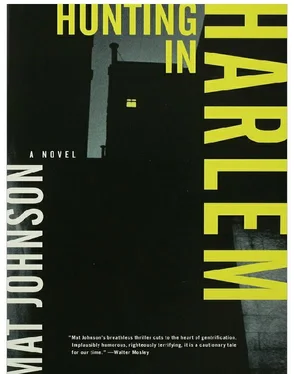First that lead cop was up there, the head of the precinct, talking about how safe the neighborhood was, about the drop in crime in the last two years, the last five. "Safe for who?" Snowden wanted to ask him, but the cop went on to clarify, point out that there had not been one incident of violent crime or robbery against any of Horizon's home owners in over a year, well below the city average. The Thirty-second Precinct was very proud, he said. What else would he say? Ladies and gentlemen, I really don't know what the hell I'm doing. The streets are run by the animals. Drug lords like Parson Boone still have more control up here than I do. Kill the poor. Applause came from the crowd when he finished, relief from Snowden. Barely a biscuit buttered and the next one was up there, this time the rep for the parole officers.
Oh, the round of applause this guy got, just looking at this loser Snowden could tell it had to be a stacked house. Rolling his eyes, Snowden suddenly wishing someone at his table was paying attention to him just so he could register his disgust formally. The PO made the point of saying he held the same union rep position Cyrus Marks had so long ago, then proceeded to clumsily reclaim all of the credit for the falling crime rate from the previous speaker. They were on them, you could be sure. They were diligent, protecting us all from the wolves. They knew "what them bastards are up to, let me tell you." No mention of the fact that his union had failed to stop the city from buying the old nursing home around the corner to use as the site for the Mumia Abu-Jamal Memorial Halfway House in the coming year, as Lester had been complaining privately for weeks now. No attempt by the speaker to hide the fact that his own ambition outdistanced even his host's accomplishments — the impersonator even called the congressman up from his dinner table to force the room into a premature show of appreciation, not letting him sit back down until they'd posed together for a picture.
Next, publisher Olthidius Cole rocked his weight from one hip to the other till he was up at the podium, taking his turn and liberties. Pancake cheeks flapping, pockmarks almost whistling from the amount of hot air pumping through. Snowden didn't find the publisher's rant nearly as amusing in person as it was on the cover of every issue of the New Holland Herald. After a few minutes of trying to make sense of Cole's seemingly random images, proclamations and denunciations, Snowden gave up. Around him, the "happy faces" picked at the carcasses on their plates, carrion shreds on their greasy cheeks. This is who Horizon was clearing the way for, Snowden marveled. The gluttonous cast as saviors.
Snowden needed to feel good again. Snowden needed to find Jifar, get a chance to be alone with the boy for the first time since he dropped him off months ago, tell him he would rescue him. Realizing that this was his chance, Snowden excused himself to the bathroom and headed upstairs to the lodge's second floor instead. That's it, he would adopt the boy, set things right again. He would serve out his year at Horizon, let Bobby win the job and brownstone, and take Jifar with him. Set up shop in Albany. Maybe get a recommendation from Bobby to counteract the prison record. Or tonight, they could go tonight. Snowden could get a job somewhere under the table, illegal immigrants did it all the time. They'd get a little apartment, Jifar'd have his own room, they'd be happy.
"But I don't want to go," Jifar told him, his eyelids barely parted. Jifar was as awake as Snowden was sober. Snowden stood next to the boy's top bunk mattress. There were drawings taped to the wall next to it that Snowden could tell were Jifar's without looking at the signature. Behind him, Snowden heard some of the other boys whispering and told them sternly to go back to sleep, waking several more up in the process.
"What do you mean you don't want to go? I'll do it, I'll be your new dad now. You don't want to go with me?" Snowden asked. He was starting to tear up. He felt silly but that just made him more upset.
"All right. If I have to, I'll go. Can all my friends come with me?" Jifar nodded to the other boys around the room, the ones pretending to sleep through this. "Will we have a Dragonball-Z Meglo Jungle Gym set in the backyard like the one here?" Jifar blinked, rolled over, and was quickly back in dream before Snowden could answer.
Defeated, Snowden stopped in the hall bathroom, its septic smell alone bringing back some of his senses. At the sink, he kept splashing water to his face as if on its surface lay all his difficulties, a film enough tries could rinse away. When he turned off the tap, the sound of an evacuating bowel in the closed stall behind him told him he wasn't alone before the voice did.
"Snowden?" Lester asked. Snowden said yes, covered his eyes with his hands so he could roll them. "I love those shoes you're wearing. Are those Florsheims?" Lester continued. Snowden confirmed this.
"Yes, I thought so. Florsheim makes an excellent shoe, always have. You know, the heat's died down a bit. It's hunting season again. There's going to be a tragic accident tomorrow night, about eleven p. M. I'll pick you up at nine-thirty. You should probably wear sneakers instead."
The Great Work refuses summarization, defiantly.
The Great Work was never intended to be reduced below its 374 page form.
If one were to be so callous, so impetuous as to strip it of its weight, to disregard its intricate artistry and hack it down to a list of mere events, harpoon those damaged, bleeding chunks together into a lifeless time line, one would probably come up with something much like the following:
A social worker from Galveston takes a job as an employee counselor in an isolated logging camp in central Alaska. The company that hires him is too cheap to hire an actual licensed psychologist for the job. It's also too cheap to hire a competent clerk at their home office in Anchorage, and a careless error by an uncaring temp results in the main character arriving at the camp two days after the end of logging season, as opposed to the beginning of it. The entire site is empty, something the social worker doesn't figure out until his pilot (the camp is accessible only by biplane) has already flown away. It is scheduled to remain vacant until "breakup," when spring comes and the ice melts and work can be done once more, which is seven months after his arrival.
Amazingly — and this is really a tribute to the mastery of craft of one Robert M. Finley — all of this happens on the first page. The rest of the novel is set in a closet.
As the company relies on cell phones, there's no way for him to contact the outside world. All but a misplaced barrel of rice has been removed from the kitchen to discourage the seven-foot-tall, eight-hundred-pound grizzlies that inhabit the region from breaking in again. There is no running water as the pipes are frozen (it's negative ten degrees Fahrenheit outside), but there's plenty of snow. The furnace will not work, but the electricity's on and he finds one plug-in heater powerful enough to keep a closet forty-eight degrees above zero.
Much of the novel is description. Much of the novel follows his batde to get as close as possible to the heater without lighting the fax cover sheets he's stuffed in his clothes for warmth on fire. They say that the Eskimos (who don't like to be called that as it is an Indian derogatory term meaning "raw fish eater") have twenty-seven words for "snow." Perhaps to underscore the uselessness of the English language to capture this environment, Finley uses just that one word, snow, so many times that the reader becomes so numb from it, it's as if they'd shoved their eyes into a mountain of the stuff.
He will not starve, but he has only rice to eat for months, and no seasonings of any kind. He will not freeze, but he is never truly warm, either. He is completely free to roam, but he must remain primarily in a closet. He even finds company in a sensitive native he meets by tracing the road out of the camp for six miles, but he quickly offends the other man and is chased off the hermit's property by gunshots (thereby learning the derogatory nature of the "Eskimo" descriptor). There are the man-eating bears the size of fuel-efficient cars, but (not to ruin it) he never sees one, so in the end they are no more than every other monstrous looming fear that haunts everyone, everywhere. Going neither up nor down, unassisted by plot or question, the prose is forced to crawl forward word by word, digging deliberately for purchase. No matter how quickly one reads The Great Work, the process never feels a moment less than seven months.
Читать дальше












